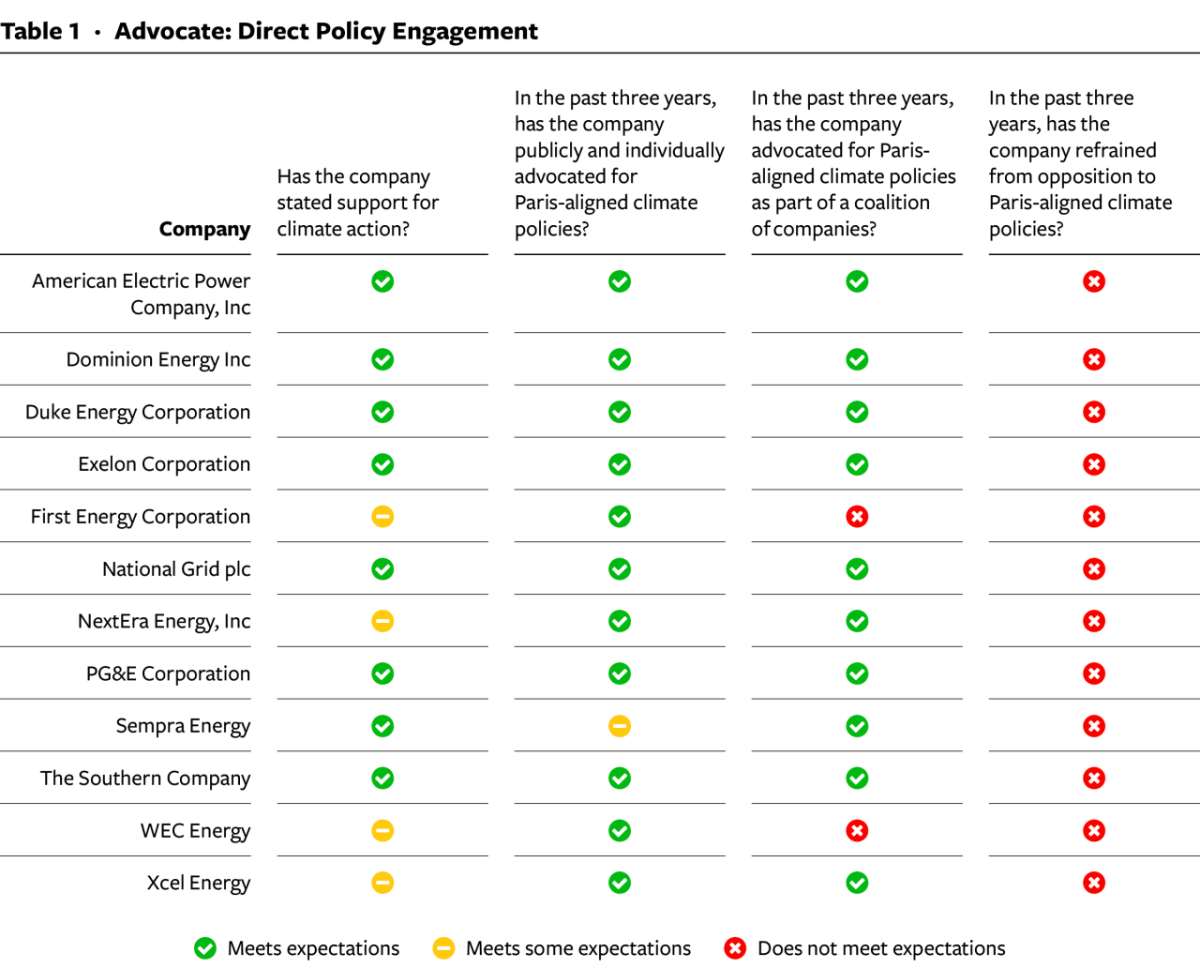New Benchmark Analysis of U.S. Utilities Sector Reveals Inconsistent Climate Policy Advocacy
January 17, 2024 /3BL/ - A new benchmark analysis of 12 of the largest U.S. electric utility companies finds significant inconsistencies between utilities’ public climate commitments and their direct and indirect climate lobbying practices.
The assessment, Toward Consistency: Assessing the Power Sector's Climate Policy Advocacy, shows that utility companies are heavily involved in climate policy engagement and are taking steps to reach their climate commitments by advocating in support of certain climate policies. However, this progress is undermined by simultaneous advocacy against other climate policies. This analysis is a follow-up to the second Responsible Policy Engagement benchmark Ceres released in November 2022, assessing the climate policy lobbying of the S&P 100 companies. It is also a follow-up to the recent benchmark on the policy engagement of the 13 largest banks.
Every company in this assessment agrees with the scientific consensus concerning the causes of climate change and all companies have lobbied either individually or as part of a coalition for Paris–aligned climate policies in the last three years. Yet, at the same time, every company assessed lobbied in opposition to Paris-aligned climate policies, illustrating the contradictory nature of the utility sector’s advocacy efforts.
“Utility companies are vital partners in the journey to achieving net zero emissions by 2050,” said Steven Rothstein, managing director of the Ceres Accelerator for Sustainable Capital Markets at Ceres.“To meet these goals it is critical that power utilities align their lobbying and embrace the enormous financial and investment opportunities presented by resources like the Inflation Reduction Act.
While the largest utility companies have set goals to reduce emissions and move away from coal, more work is urgently needed if we hope to mitigate the catastrophic effects of global warming.”
Other findings show that compared to the 2022 Benchmark, in which only 50% of S&P 100 companies had lobbied in favor of climate policies, the electric utilities sector is significantly more active in voicing its support compared to other sectors. In addition, the utilities sector has a better track record than S&P 100 companies in terms of conducting trade association alignment assessments, with 33% of utilities having completed an alignment assessment, compared to only 8% of companies overall in the S&P 100.
“Policy engagement is an incredibly powerful tool in the fight against climate change” said Dan Bakal, Senior Program Director, Climate and Energy at Ceres. “If utility companies are serious about meeting their climate commitments, then their advocacy must align with their ambitions.”
While the sector is ahead of the curve in its advocacy in favor of climate policies, many of the utilities have failed to acknowledge the obstructive nature of the trade associations in which they are members. For example, the American Gas Association (AGA), has explicitly lobbied against climate policies, or only shared top-line statements on climate policy.
The benchmark analysis recommends that utilities:
- Consistently lobby in favor of policies that will achieve net zero emissions. It is in the best interest of utilities to be supportive of clean energy given that the sector will play a central role in economy-wide decarbonization.
- Collaborate with state and federal officials on policy design and engage more consistently with state and federal policymakers.
- Create a synchronized approach to climate policy advocacy by actively engaging with industry associations and take meaningful steps towards addressing misalignment with their trade associations
“The new guidance from Ceres takes responsible policy engagement to a deeper level for U.S. utilities,” said Dominic Gogol, Deputy Director of Policy for the We Mean Business Coalition. “It highlights the inconsistency of the utilities’ climate advocacy through direct lobbying and trade associations, why this is problematic and steps to improve climate advocacy practices. U.S. utilities are an essential player in the U.S. economy’s transition to clean energy, and they can wield their influence more effectively to ensure the passage and implementation of ambitious and market-orientated policies at the federal and state level.”
Aligned with these recommendations, Ceres' Ambition 2030 aims to decarbonize the six highest emitting industries by driving greater corporate climate action. These sectors—electric power, banking, food, agriculture, oil and gas, steel, and transportation—contribute to about 80% of total U.S. emissions based on 2019 data from the Environmental Protection Agency. Responsible policy engagement consistent with climate science is an essential expectation of companies in these sectors.
About Ceres
Ceres is a nonprofit organization working with the most influential capital market leaders to solve the world’s greatest sustainability challenges. The Ceres Accelerator for Sustainable Capital Markets is a center of excellence within Ceres that aims to transform the practices and policies that govern capital markets to reduce the worst financial impacts of the climate crisis. It spurs action on climate change as a systemic financial risk—driving the large-scale behavior and systems change needed to achieve a net-zero emissions economy through key financial actors including investors, banks, and insurers. The Ceres Accelerator also works with corporate boards of directors on improving governance of climate change and other sustainability issues. For more information, visit ceres.org and ceres.org/accelerator and follow @CeresNews.
Media contact:
Diane May, Ceres



